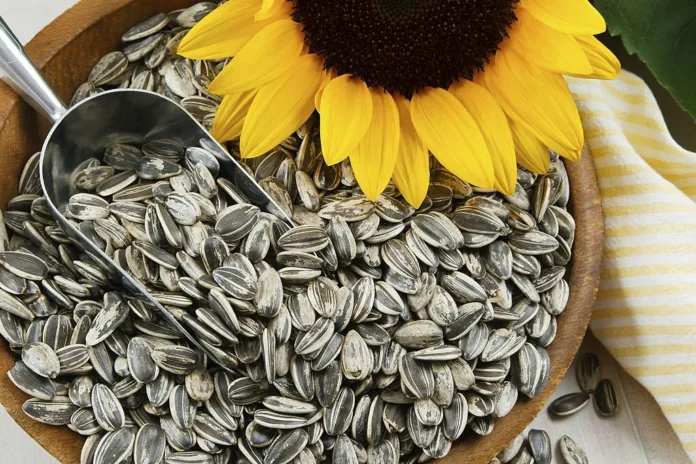Sunflower seeds, tiny nutritional powerhouses, are not only a delicious snack but also a treasure trove of health benefits. These versatile seeds, packed with an array of nutrients, can positively impact your overall well-being. Let’s delve into the remarkable health advantages that sunflower seeds offer.
1. Rich in Heart-Healthy Fats:
Sunflower seeds are an excellent source of monounsaturated and polyunsaturated fats, particularly linoleic acid. These healthy fats play a crucial role in maintaining heart health by reducing LDL (bad) cholesterol levels and increasing HDL (good) cholesterol levels. This helps prevent the buildup of plaque in arteries, lowering the risk of heart disease, stroke, and other cardiovascular complications.
2. Abundant Source of Vitamin E:
Vitamin E, a powerful antioxidant, is found in abundance in sunflower seeds. This antioxidant helps neutralize harmful free radicals, protecting cells from damage and reducing oxidative stress. Vitamin E is essential for maintaining a healthy immune system, protecting against chronic diseases, and promoting healthy skin and hair.
3. Excellent Source of Magnesium:
Magnesium, a mineral essential for various bodily functions, is plentiful in sunflower seeds. Magnesium contributes to muscle and nerve function, blood sugar control, and blood pressure regulation. Adequate magnesium intake helps reduce the risk of high blood pressure, type 2 diabetes, and muscle cramps.
4. Rich in Fiber:
Sunflower seeds are a good source of dietary fiber, which plays a vital role in digestive health. Fiber helps regulate bowel movements, promotes satiety, and contributes to a healthy gut microbiome. It also aids in blood sugar control and cholesterol management.
5. Source of Plant-Based Protein:
Sunflower seeds offer a valuable source of plant-based protein, making them an excellent choice for vegetarians and vegans. Protein is essential for building and repairing tissues, maintaining muscle mass, and supporting various bodily functions.

6. Enhanced Antioxidant Capacity:
Sunflower seeds contain a variety of antioxidants, including vitamin E, selenium, and phenolic compounds. These antioxidants help protect cells from damage caused by free radicals, reducing the risk of chronic diseases such as cancer, heart disease, and neurodegenerative disorders.
7. Potential Anti-Inflammatory Effects:
Studies suggest that sunflower seeds may possess anti-inflammatory properties due to their content of vitamin E, magnesium, and other antioxidants. Reducing inflammation can help alleviate symptoms of chronic inflammatory conditions such as arthritis and inflammatory bowel disease.
8. Promote Bone Health:
Sunflower seeds contain magnesium, phosphorus, and copper, minerals essential for maintaining bone health. These minerals contribute to bone density and strength, reducing the risk of osteoporosis and fractures.
Incorporating Sunflower Seeds into Your Diet:
Sunflower seeds can be easily incorporated into your diet in various ways. They can be enjoyed as a healthy snack on their own, added to trail mixes, sprinkled on yogurt or salads, or incorporated into baked goods. Sunflower seed butter, a delicious and nutritious spread, can be used on toast, crackers, or fruit.
Conclusion: Sunflower seeds, nature’s tiny nutritional gems, offer a wealth of health benefits. Their rich nutrient profile, including heart-healthy fats, vitamin E, magnesium, fiber, and plant-based protein, contributes to overall well-being.
By incorporating sunflower seeds into your diet, you can reap the benefits of improved heart health, enhanced antioxidant capacity, reduced inflammation, and stronger bones. Embrace the versatility and nutritional goodness of sunflower seeds and experience a healthier, happier you.




